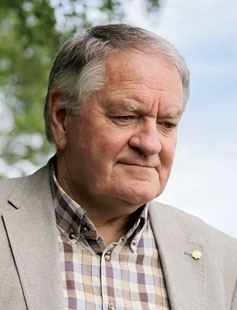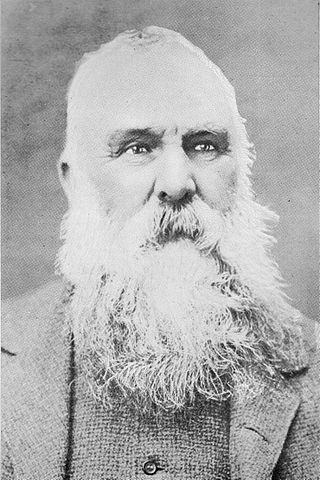
Llywelyn ap Gruffudd, sometimes written as Llywelyn ap Gruffydd, also known as Llywelyn the Last, was the native Prince of Wales from 1258 until his death at Cilmeri in 1282. Llywelyn was the son of Gruffydd ap Llywelyn Fawr and grandson of Llywelyn the Great, and he was one of the last native and independent princes of Wales before its conquest by Edward I of England and English rule in Wales that followed, until Owain Glyndŵr held the title during the Welsh Revolt of 1400–1415.

The Kingdom of Gwynedd was a Welsh kingdom and a Roman Empire successor state that emerged in sub-Roman Britain in the 5th century during the Anglo-Saxon settlement of Britain.

Dafydd Iwan Jones is a Welsh singer and nationalist politician who rose to fame writing and performing folk music in the Welsh language. From 2003 to 2010, Iwan was the president of Plaid Cymru, a political party which advocates for Welsh independence from the UK.

Sir John Morris-Jones was a Welsh grammarian, academic and Welsh-language poet.

Lewis Edward Valentine M.A. was a Welsh politician, Baptist pastor, author, editor, and Welsh-language activist. He was the first leader of the Welsh political party Plaid Cymru.

Penyberth was a farmhouse at Penrhos, on the Llŷn Peninsula near Pwllheli, Gwynedd, which had been the home to generations of patrons of poets, and also a way-station for pilgrims to Bardsey Island, but destroyed in 1936 in order to build a training camp and aerodrome for the RAF.

Michael Daniel Jones was a Welsh Congregationalist minister and principal of a theological college, but is best remembered as a founder of the Welsh settlement in Patagonia known as Y Wladfa and as one of the fathers of modern Welsh nationalism.
David James Jones, commonly known by his bardic name Gwenallt, was a Welsh poet, critic, and scholar, and one of the most important figures of 20th-century Welsh-language literature. He created his bardic name by transposing Alltwen, the name of the village across the river from his birthplace.
This article is about the particular significance of the year 1774 to Wales and its people.
This article is about the particular significance of the year 1770 to Wales and its people.

John Edward Daniel (1902–1962) was a Welsh theologian and college lecturer who became chairman of the Welsh political party Plaid Cymru.
Events from the year 1764 in Wales.
Richard Bryn Williams, or Bryn Williams (1902–1981), was a Welsh writer, poet, playwright and historian. From 1975 to 1978 he was Archdruid of the National Eisteddfod of Wales.

"The Girls of Llanbadarn", or "The Ladies of Llanbadarn", is a short, wryly humorous poem by the 14th-century Welsh poet Dafydd ap Gwilym, in which he mocks his own lack of success with the girls of his neighbourhood. Dafydd is widely seen as the greatest of the Welsh poets, and this is one of his best-known works. The poem cannot be precisely dated, but was perhaps written in the 1340s.

"The Seagull" is a love poem in 30 lines by the 14th-century Welsh poet Dafydd ap Gwilym, probably written in or around the 1340s. Dafydd is widely seen as the greatest of the Welsh poets, and this is one of his best-known and best-loved works.
Caryl Lewis is a Welsh novelist. She won the Wales Book of the Year in 2005 with her novel Martha Jac a Sianco, which was adapted into a film in 2008.
John Gwilym Jones was a Welsh dramatist, novelist, short-story writer, drama director, academic and critic, considered a pre-eminent figure in those fields. In particular, he is widely acknowledged to be one of the two greatest 20th-century Welsh playwrights, along with Saunders Lewis; of his many plays, Hanes Rhyw Gymro (1964), Ac Eto Nid Myfi (1976) and Yr Adduned (1979) are considered masterpieces. Almost all of his work was written in the Welsh language. A writer in the modernist tradition, he is credited with introducing Brechtian techniques, stream-of-consciousness narrative and Freudianism to Welsh literature. Creative writers such as Kate Roberts and John Rowlands owed him a profound debt, and a whole generation of critics were influenced by his work as a teacher of Welsh literature.
"The Ruin" is a cywydd by the 14th-century Welsh poet Dafydd ap Gwilym, widely seen as the greatest of the Welsh poets. In it the poet, considering a ruined house and remembering the love-affair he once conducted there, reflects on the transience of all worldly pleasures. "The Ruin" is commonly supposed to have been written in Dafydd's old age. It has been called one of his most poignant poems, and it was included in The Penguin Book of Welsh Verse, The Oxford Book of Welsh Verse, The Oxford Book of Welsh Verse in English and The Longman Anthology of British Literature.

"The Mirror" is a poem in the form of a cywydd by the 14th-century bard Dafydd ap Gwilym, widely seen as the greatest of the Welsh poets. The poem describes how Dafydd, languishing with lovesickness for an unnamed Gwynedd woman, is appalled by the wasted appearance of his face in the mirror. "The Mirror" can be grouped with several other of Dafydd's poems, possibly early ones, set in Gwynedd, or alternatively with the many poems in which he expresses his love for a woman he calls Morfudd. It has been called "perhaps Dafydd's greatest masterpiece in the genre of self-deprecation".









